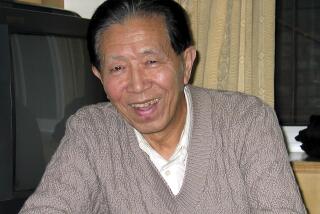Jiang’s Bid to Bring Capitalists Into Communist Fold Roils Cadres
- Share via
BEIJING — Appalled by what they see as a sellout, Communist Party hard-liners have lashed out at Chinese President Jiang Zemin, warning that his recent comments opening the door for capitalists to join the party could lead to its collapse.
Jiang’s comments, made in a speech marking the 80th anniversary of the party’s founding, have caused “great ideological confusion among the broad masses of party members and high-ranking cadres,” said an open letter to the party leadership purportedly written by former propaganda boss Deng Liqun and 16 other party elders.
The dissent resulting from Jiang’s decision “will sow the seeds of an organizational schism in the Chinese Communist Party,” the letter said. It compared Jiang to the last leader of the Soviet Union, Mikhail S. Gorbachev, whom China’s leftists consider a traitor to the Communist cause.
Some alleged signatories have publicly denied being parties to the letter, but its arguments are consistent with articles published in recent years in orthodox Marxist journals.
The letter also pointed out that Jiang’s remarks violated not only a 1989 ban on entrepreneurs joining the Communist Party but also the party charter, by failing to present what amounted to a major policy decision to the party’s Central Committee or Politburo.
“The leaders and the hard-line leftists are all Communists,” independent analyst Zhong Dajun said. “It’s just that those in power have no choice but to compromise in the face of current economic conditions, while the hard-liners can snipe while hanging on to their impractical dogma.”
“It’s hard to say which side is stronger in this debate,” said Bruce Dickson, a China expert at George Washington University. “In the end, I think Jiang will probably get away with it.”
The question of whether to admit capitalists to the party has been simmering for at least a decade.
Zhang Dejiang is the party secretary of Zhejiang province, a region with some of China’s biggest enclaves of free enterprise. In April, he wrote in the journal Party Building Research that the party’s policies encouraged entrepreneurs to get rich and that their legitimate desire to join the party is “a manifestation of their political demands for progress.”
But to allow them to join the party would make workers and peasants think that “whoever is rich can join the party,” Zhang wrote, and cause those on the lowest rungs of the economic ladder to “misunderstand the party and emotionally distance themselves from the party.”
“The party Central Committee’s rules banning private entrepreneurs from joining the party must be strictly enforced,” he concluded.
Little of the debate is evident in the Chinese media, whose mainstream has fallen into lock-step in describing officials and citizens as endorsing Jiang’s speech. In a rare move to silence Jiang’s critics on the left, authorities have ordered the closure of the Pursuit of Truth, a leading orthodox Marxist journal, Hong Kong media have reported.
Still, some analysts said they doubt that the Communist Party can absorb all the disparate interest groups in China’s increasingly stratified society.
“What single party can represent an entire society?” Zhong asked. “Jiang’s tactic has angered the leftists and has not won the support of the entrepreneurs. It has weakened Jiang’s authority, and it won’t work.”
Historians point out that the Communists’ predecessors, the Nationalists, lost their revolutionary purpose and were torn by factionalism partly because they accepted all applicants, from idealistic young students to regional warlords.
Few analysts believe that by inviting capitalists to become members, the party wants to share political power with them, just as few capitalists join the party to pursue the goal of communism. Instead, Jiang’s move appears to be more a bid to co-opt entrepreneurs while at the same time accommodating them.
“In a democratic society, this could be seen as a move toward openness. But in China, it just looks like an opportunity for more corruption,” said one academic, speaking on condition of anonymity.
Chinese governments from the imperial era to the 1911-49 Nationalist regime have kept emerging mercantile classes from holding substantial political power, instead keeping them dependent on government patronage while extracting revenues from their activities.
Leftists argue that entrepreneurs’ interests are already adequately represented by those businesspeople who are members of the legislature, organizations such as the All-China Federation of Industry and Commerce, and other generally politically powerless bodies.
A prime example of entrepreneurs co-opted by the party is “red capitalist” Rong Yiren, who held the largely ceremonial post of vice president from 1993 to 1998 and, according to Forbes magazine, is China’s richest man.
More to Read
Sign up for Essential California
The most important California stories and recommendations in your inbox every morning.
You may occasionally receive promotional content from the Los Angeles Times.













